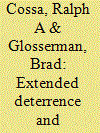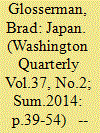| Srl | Item |
| 1 |
ID:
102388


|
|
|
|
|
| Publication |
2011.
|
| Summary/Abstract |
Members of the Japanese government and the Japanese security elite welcomed the 2010 US Nuclear Posture Review (NPR) Report, praising its emphasis on the twin goals of pursuing disarmament and protecting international peace and stability. Unlike many non-nuclear weapon states, Japan does not condition its support for nonproliferation upon nuclear weapon states' progress on denuclearization. Despite general enthusiasm for the review in Japan, concerns remain. The NPR emphasizes the threat posed by nuclear weapons in the hands of non-state actors; from Japan's vantage point, state actors-North Korea, China, and Russia-are just as worrisome. While disarmament advocates in Japan had hoped the NPR would endorse a no-first-use doctrine or "sole purpose" declaration, defense officials and strategists were relieved it did not go that far, fearing that to do so would undermine US extended deterrence and leave Japan vulnerable to attack by North Korean biological or chemical weapons. US policy toward China shadows many Japanese concerns about security policy in general and nuclear policy in particular. In the absence of more clarity on the Sino-US relationship, Japanese concerns can be expected to increase. Nonetheless, the Japanese government has responded positively to the release of the NPR, in large part due to unprecedented levels of coordination and consultation between Tokyo and Washington during the drafting process. Tokyo now seeks continued close consultation on nuclear strategy and policy to develop a better understanding of the concept of extended deterrence and what Tokyo can do to support this shared goal.
|
|
|
|
|
|
|
|
|
|
|
|
|
|
|
|
| 2 |
ID:
133159


|
|
|
|
|
| Publication |
2014.
|
| Summary/Abstract |
Japanese Prime Minister Abe Shinzo's goal is simple: end all doubts about his country's status as a first-tier nation. From inventing the Abenomics program, intended to spark an economic rejuvenation, to creating new security institutions as well as articulating new defense policies and doctrines, the Abe administration has focused on creating the conditions which would allow Japan to more forcefully assert and defend its national interests. Over a year into his first term, signs are good: the economy has rebounded; defense spending is up; Tokyo has pursued a new, aggressive diplomacy re-establishing its bona fides in the region and beyond; and the Japanese seem to be more optimistic about their prospects.
|
|
|
|
|
|
|
|
|
|
|
|
|
|
|
|
| 3 |
ID:
181341


|
|
|
|
|
| Summary/Abstract |
Japan has been on a run for the last eight years. Former Prime Minister Abe Shinzo, whose two terms in office in 2006–07 and 2012–20 made him the country’s longest-serving prime minister, vowed to reinvigorate Japan after two decades of stagnation, and he made important progress. While he was applauded for his diplomatic activism and for revamping the national security bureaucracy, little attention has been paid to the rise of economic statecraft during his tenure within Japan’s foreign policy and national security calculus, a policy and focus that continues in the Suga administration.
|
|
|
|
|
|
|
|
|
|
|
|
|
|
|
|
| 4 |
ID:
064815


|
|
|